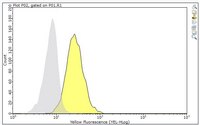Modulation of telomere protection by the PI3K/AKT pathway.
Méndez-Pertuz, M; Martínez, P; Blanco-Aparicio, C; Gómez-Casero, E; Belen García, A; Martínez-Torrecuadrada, J; Palafox, M; Cortés, J; Serra, V; Pastor, J; Blasco, MA
Nat Commun
8
1278
2017
Show Abstract
Telomeres and the insulin/PI3K pathway are considered hallmarks of aging and cancer. Here, we describe a role for PI3K/AKT in the regulation of TRF1, an essential component of the shelterin complex. PI3K and AKT chemical inhibitors reduce TRF1 telomeric foci and lead to increased telomeric DNA damage and fragility. We identify the PI3Kα isoform as responsible for this TRF1 inhibition. TRF1 is phosphorylated at different residues by AKT and these modifications regulate TRF1 protein stability and TRF1 binding to telomeric DNA in vitro and are important for in vivo TRF1 telomere location and cell viability. Patient-derived breast cancer PDX mouse models that effectively respond to a PI3Kα specific inhibitor, BYL719, show decreased TRF1 levels and increased DNA damage. These findings functionally connect two of the major pathways for cancer and aging, telomeres and the PI3K pathway, and pinpoint PI3K and AKT as novel targets for chemical modulation of telomere protection. | 29097657
 |








